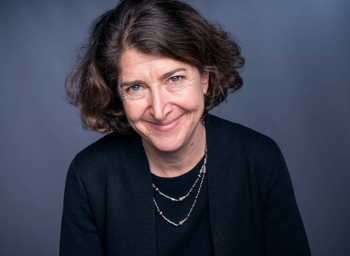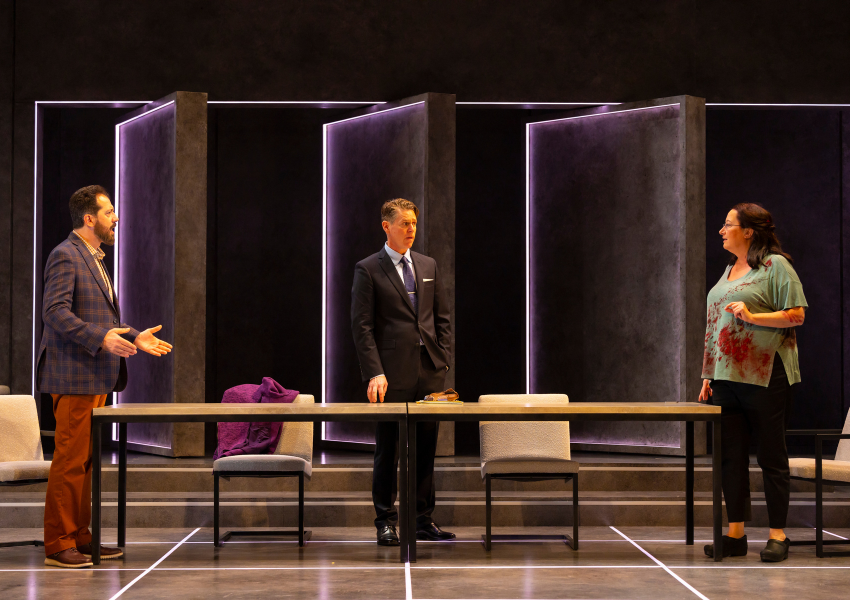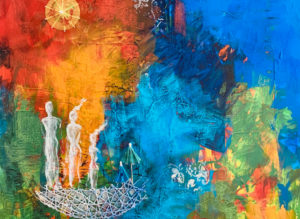Having Grown up in Mexico City, Melia Bensussen now Translates Words into Depth on the Stage
Published Feb 10, 2023

Interview with Melia Bensussen, Theatre Director

February 4, 2023.
I recently had the opportunity to sit down with award-winning theatre director Melia Bensussen to talk about the play she is directing, The Art of Burning, at both The Huntington (Boston) and the Hartford Stage. Bensussen has taught theatre at Emerson College and has a fascinating perspective as a Jew born in Mexico City.
Deborah Leipziger (DL): What was it like to grow up Jewish in Mexico City?
Melia Bensussen (MB): It was quite wonderful growing up in Mexico City. We were known as “Israelitas”, and I grew up in both Ashkenazi and Sephardic communities.
I was raised in a very Jewish neighborhood with all the required little shops. We had a kosher butcher and a bakery where we could buy our challah. It was in some ways, a very late 19th century middle-Europe kind of upbringing. There was antisemitism, but as a child, I took it for granted. My school uniform had a Magen David on the sweater that we wore every day, and some days we were advised to wear the sweater inside-out as a precaution. I also remember various bomb threats to the school.
At first, we attended Sephardic synagogues, and I have great memories of big Sephardic holidays, particularly Seders. There was singing and drinking – at least by the men of the family! The women were mostly in the kitchen, deep frying all sorts of wonderful foods. My father’s mother, my Abuelita, spoke Ladino, which I can understand to this day thanks to my having learned Hebrew and being fluent in Spanish.
DL: Do you consider yourself Latina? I know this is a very personal question, but it is something I think about a lot, as a Brazilian-born Jew.
MB: I love this question! These issues are endlessly complex. Mostly, I answer that I grew up as a Jew in Mexico City and that my father was Mexican. I think this is complicated by the fact that I was raised by my biological mother and adopted father. I am genetically Ashkenazi, and did not get to know my biological father until I was much older. So, my Papi was my father and his culture was mine.
The Mexico I grew up in is probably long gone. I have memories of truly sticking out because I had long blonde hair and blue eyes. I recall sometimes being asked if I saw everything in blue, or if they could touch my hair. I suppose in some ways, that experience was not dissimilar from arriving in the United States at fifteen and people being confused by my having come from Mexico. There’s something about the isolation that occurs in being different in a culture – something that one carries within and perhaps helps one (one hopes) empathize with the Other as one has experienced that Otherness.
When I first got to the Hartford Stage, I would tell people not to introduce me as Latina. I was then lucky enough to get to know a Cuban-born board member, who upon hearing my story and my concerns, said “Nonsense, you’re one of us – we need a Latina leader for this institution, and your knowledge of both American and Mexican cultures is essential to who you are.” That was a gift.
DL: Which were the first plays you saw performed?
MB: I was four years old when I first saw children’s theatre, and I immediately fell in love. The theater had a recurring character named “El Zapatero Remendon”. He was a comedic shoemaker and had an enormous plastic hammer. He’d work through the audience hitting children’s shoes on the soles and “repairing” them. Even now, more than five decades later, I can still feel him tapping on my shoes.
DL: What playwrights and directors influenced you?
MB: In college, I first became fascinated with the work of Federico Garcia Lorca, the Spanish playwright and poet who was murdered by the Franco fascists in Spain in the 30s. The work on his poetry and plays led me to think about a Jewish version of such work, and I ended up in love with Yiddish playwriting, particularly S. Ansky’s extraordinary work The Dybbuk. I am drawn to stories that need to be told in a theatre. I love to ponder the question: what makes something theatrical? Why is not just a novel or poem? Why is it alive?
DL: Tell us what it was like to work with playwright Kate Snodgrass. Have you worked with her before?
MB: Working with Kate is a joyous collaboration. We met thanks to Charlotte Meehan and her theatre Sleeping Weasel. Charlotte created an evening of theater titled BADASS, and it featured work by three amazing women artists. Kate wrote and performed a one-act play there called Bark’s Tempest. It was magical.
I love Kate’s work and it is an ideal collaboration, as Kate wants other voices to join her in the process. She writes for actors and directors to add their emotional responses and thoughts to the work. We did a reading of the play at the Huntington in 2019. Due to the pandemic, our progress was slowed and yet, here we are three years later finally able to see the fruits of her labor on our stages.
DL: How do you see your role as theatre director?
MB: I’ve often felt that directing was a natural evolution of my translating. I translated as a child from Spanish to English and back. I was the only one in my family who spoke Hebrew growing up, so there was that as well. In theatre, I feel I translate a playwright’s vision to the stage, giving depth to meet their words.
DL: What drew you to the play, “The Art of Burning”?
MB: The Art of Burning is the most women-centric play I have ever read. I have always brought a feminist perspective to plays, but this was different. The Art of Burning captures so many fault lines in our society, both for women of a certain age and also for women in their 20s.
DL: I love the title of the play. I love how it riffs off of Elizabeth Bishop’s poem “The Art of Losing”.
MB: The title of the play is an example of how the play evolved. The first title was “Medea Redux”, which we thought gave too much away. Then the working title became “Redux”.
The Art of Burning was the third title.
There are so many assumptions about women’s lives still alive in our culture, like assumptions about our emotional instability. Words like “hysterical” continue to be powerful. Even the men closest to us can be oblivious to the reality women face. For Kate, Adrianne (the main actress), and I, working on the play allowed us an opportunity to dissect our own experiences, and explore how we have been made – or worse, made ourselves – marginal.
DL: Are any of the characters in the play Jewish?
MB: No. we don’t reveal much about the characters from a religious point of view. Katya (the other woman) initially had a call she made in Spanish but we decided to change that to English, as we worried people would make assumptions about the character that we did not intend.
DL: Do you still have family in Mexico City? Do you visit?
MB: I still have family in Mexico City. It has been a while since we visited. My son went and took pictures of the street where we lived. It was wonderful to see my childhood through his eyes.
Melia Bensussen is the Artistic Director of the Hartford Stage. “The Art of Burning” will be performed at The Huntington until February 12, 2023. The play will run at the Hartford Stage from March 2 -26, 2023.
Click here to view the digital program book for the production at The Huntington.
Interview conducted by Deborah Leipziger, author, poet and poetry curator for Kolture.
Deborah’s latest book is Story & Bone.
Above:
Photo Credit: T Charles Erickson
© T Charles Erickson Photography
tcharleserickson@photoshelter.com
Rom Barkhordar, Michael Kaye, and Adrianne Krstansky.
The Art of Burning
January 13 – February 12, 2023
A play by Kate Snodgrass
Directed by Melia Bensussen
In association with Hartford Stage
The Huntington Calderwood/BCA, 527 Tremont St.
Deborah Leipziger is a poet, author, and advisor on sustainability. Three of her poems have been nominated for a Pushcart Prize. Born in Brazil, Ms. Leipziger is the author of Story & Bone, forthcoming from Lily Poetry Review Books in early 2023. Her poems have been published in the UK, US, Canada, Mexico, Colombia, Is...
Reflections
Share
Can you recall the first play(s) you saw? What impact did it have on you, if any?
For creatives:
Reflect on the ways your identity is intersectional. How does your intersectionality impact your creative expression?
Consider
Do you think there are elements of ethnicity that might be considered non-binary?
Want more?
Get curated JewishArts.org content in your inbox


